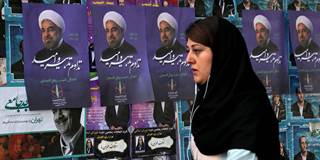In the 1980s, the US did not formulate its policy toward the Soviet bloc without careful consideration of political developments there. It would be folly for the US to formulate policy on Iran without giving domestic developments there the attention they deserve.
PALO ALTO – Iran’s presidential election on May 19 was paradoxical and potentially pivotal. It began as a sleepy affair – a likely victory for the incumbent, Hassan Rouhani, running against a motley crew of conservative has-beens or upstarts. Moreover, a two-term presidency has been the default in the Islamic Republic since 1981. Early attacks on Rouhani were thus seen as efforts by Supreme Leader Ali Khamenei, his conservative clerical allies, and the Revolutionary Guards to weaken and contain the incumbent in his second term.
But then the election became a heated contest, as the conservatives coalesced around a dark horse candidate, Ebrahim Raisi, a hardline jurist with a history of brutality against the opposition. The fact that Khamenei had earlier named Raisi to head the largest religious endowment in Iran was now seen not as a sinecure, but as a move to position him as a possible future Supreme Leader.
It was widely believed that a win for Raisi would virtually guarantee his success in the eventual battle to succeed Khamenei, who himself had been President when he was catapulted to the position of Supreme Leader, following the death of Ayatollah Ruhollah Khomeini. With Khamenei reported to be suffering from cancer, the question of succession has become acute. As a result, the conservatives’ considerable ideological, institutional, and propaganda apparatus was mobilized in favor of Raisi, and against Rouhani.

PALO ALTO – Iran’s presidential election on May 19 was paradoxical and potentially pivotal. It began as a sleepy affair – a likely victory for the incumbent, Hassan Rouhani, running against a motley crew of conservative has-beens or upstarts. Moreover, a two-term presidency has been the default in the Islamic Republic since 1981. Early attacks on Rouhani were thus seen as efforts by Supreme Leader Ali Khamenei, his conservative clerical allies, and the Revolutionary Guards to weaken and contain the incumbent in his second term.
But then the election became a heated contest, as the conservatives coalesced around a dark horse candidate, Ebrahim Raisi, a hardline jurist with a history of brutality against the opposition. The fact that Khamenei had earlier named Raisi to head the largest religious endowment in Iran was now seen not as a sinecure, but as a move to position him as a possible future Supreme Leader.
It was widely believed that a win for Raisi would virtually guarantee his success in the eventual battle to succeed Khamenei, who himself had been President when he was catapulted to the position of Supreme Leader, following the death of Ayatollah Ruhollah Khomeini. With Khamenei reported to be suffering from cancer, the question of succession has become acute. As a result, the conservatives’ considerable ideological, institutional, and propaganda apparatus was mobilized in favor of Raisi, and against Rouhani.